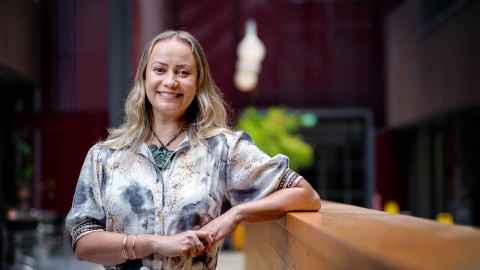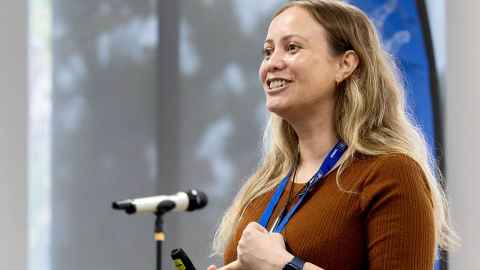Jade Le Grice: sexuality, sovereignty and science
3 June 2025
Making space for Indigenous science to flourish is part of the Māori health leader’s big vision.

Marking the dawn of a new year, Matariki is a time for reflection and setting goals in pursuit of a vision.
And for Dr Jade Le Grice, the vision is, and always has been, big: to reclaim “our stories, our tapu and our ways of being”.
Associate Dean Māori in the Faculty of Science, Jade (Ngāpuhi, Te Rarawa) is a senior lecturer in psychology, whose research focuses on what it means to decolonise sexuality, reproduction and gendered identity in Aotearoa.
Her research challenges colonial norms that have dictated perceptions of the bodies, sexualities and places in the world of Māori.
It’s not just about reclaiming Māori knowledge, says Jade, but reclaiming the essence of who Māori are.
She also supports a wider vision for Māori in science, as co-director of Te Pūtahi o Pūtaiao – a Faculty of Science research centre that bridges mātauranga Māori and science. It aims to make space for Indigenous science to flourish, promoting inclusive research that benefits not only academia but also Māori communities.
Seeing the systems
Jade was recently recognised among 100 Māori leaders in health by Te Rau Ora, an organisation providing a range of programmes to improve Māori health outcomes.
Leadership and a history of resistance run deep in her whānau.
Jade was born in Rawene in the Hokianga where, in 1898, her great-great-grandfather, Hōne Tōia, led the Dog Tax rebellion. Jade also recounts how her great-great-great kuia, Rihi Hancy, was jailed for removing pegs from government-surveyed land that was being stripped from her whānau, and carried the same rebellious spirit.
However, these were not just acts of protest, says Jade, they were assertions of mana motuhake, or sovereignty – something she carries into her research work today.
“I fell in love with kaupapa Māori because it gave me a way to compassionately understand how Māori experiences are shaped by social oppression,” she says.
“That had powerful implications for me because it shifted my way of thinking about myself in deficit terms to instead recognise the social norms that shape and constrain opportunities, behaviours, or other people’s expectations of me.
“So, from that basis my research has focused on deconstructing colonial discourse and racialised understandings of Māori reproduction and sexuality. I also focus on how we as Māori understand ourselves, and sometimes participate in our own marginalisation.”
Resistance and restoration
In essence, Jade’s research involves peeling back layers of social norms and assumptions to rediscover who Māori were prior to colonisation and using that understanding to reimagine the future; it’s an act, she says, of resistance and restoration.
That had powerful implications for me because it shifted my way of thinking about myself in deficit terms.
With the issue of abortion, for example, she explains: “For years there was an assumption that Māori were inherently pro-life, or anti-abortion. But dichotomies like this tend to mask a fuller picture of complexity, inviting questions like: what informs Māori perspectives on abortion? What are Māori experiences of abortion? How do we hold space for those who have had abortions, and allow for diverse views in our theorising?”
Another example relates to the ages of childbearing.
“Western models see early reproduction as a deficit,” she says. “But from a Māori perspective, having children younger can make you rich. Not in wealth, but in whakapapa, legacy and love.”
Through the voices of her research participants, Jade highlights how young Māori parents view themselves as carrying forward ancestral lines, raising tamariki within whānau systems, and tapping into intergenerational wisdom. She recalls one participant telling her, that although he might not be rich in money, he was rich in whakapapa, with his legacy carried through his tamariki and mokopuna. Yet, these are truths that Western frameworks often fail to recognise, says Jade.
Another focus of Jade’s work is critiquing persistent stereotypes of Māori as violent or hyper-sexual, which she says are harmful and lead to the criminalisation and over-surveillance.
Rather than internalising these stereotypes, however, Jade’s research encourages Māori to “reclaim how we see ourselves through our mātauranga and tikanga”.
“Young people are telling us that becoming a sexual being today means having to contend with challenging ideas about who they are as Māori women and men – some deeply racialised, some inherited. So we ask: how do they understand their own mana and tapu? How do they understand their responsibility to uphold the mana and tapu of others when they are in relationships? How do they understand what it means to be wāhine or tāne within te ao Māori?”
Looking to the future
Jade will play a role in bringing together wider Māori perspectives in science this September, when Te Whare Pūtaiao, Faculty of Science will host its second Pūtaiao Research Symposium, celebrating mātauranga Māori in science.
This year, the event will be held in the North, Jade’s home turf. For her, it represents more than an academic gathering; it’s also an opportunity to build community connections and foster the next generation of Māori scientists.

The symposium is a collaborative effort between Te Whare Pūtaiao, Te Pūtahi o Pūtaiao, and Ngā Motu Whakahī. The latter is a Faculty of Science initiative that offers mentoring to Māori and Pacific undergraduate students, helping them gain research experience and develop career skills in academia.
The symposium aims, she says, to bring more Māori voices into conversations about science.
“We will hear about initiatives that are empowering communities to advocate for the preservation of our taonga and sustain our natural world,” she says. “These efforts also address urgent issues like community health, pūtaiao education, and Māori development.”
Jade is especially passionate about expanding Indigenous science networks and bringing communities along on the journey. She sees the integration of Māori knowledge with a range of science disciplines as key to solving contemporary problems.
“We have incredible Māori minds working and innovating in science, and bridging mātauranga with their disciplinary knowledge. We want to showcase the work of our scholars to spark the enthusiasm of the future scientists in our whānau,” she says.
“There’s a growing number of scientists who speak te reo Māori and are comfortable and familiar in Māori contexts. They’re working to uphold the integrity of our mātauranga in the discipline of science and creating pathways to share that with our students, including the recent creation of a stage 2, Pūtaiao 200 course.”
This approach, says Jade, is not just philosophical; it’s practical. It’s about harnessing Māori potential to solve real-world problems affecting the human condition.
Jade is optimistic that initiatives like Te Pūtahi o Pūtaiao will continue to develop, creating long-term research projects that benefit not only the academic community but Māori whānau and communities across Aotearoa and beyond.
Jade is also involved with Ngā Motu Whakahī, which she says encourages Māori and Pacific students to explore their cultural identities while pursuing their academic careers.
“It’s about giving them a space to cultivate their identities as future scientists and as tangata whenua.”
Te Rina Triponel
Pūtaiao Research Symposium will be held in Whangārei over three days in September.
This article first appeared in the June 2025 isue of UniNews.